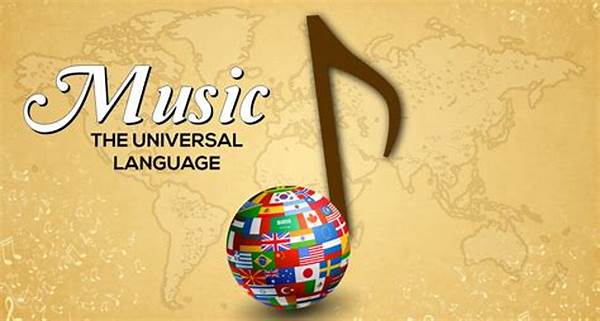Music has always been regarded as a connective force, a means of communication that transcends the barriers of nations and cultures. When words fall short, music does the talking. It is an expository fact, widely understood and embraced, that music acts as a universal language. Regardless of one’s native tongue or cultural background, music speaks to the soul in an unmatched manner. Let’s explore how music breaks down walls and fills the air with understanding.
Read Now : **music Collaboration Community Networks**
The Power of Connection Through Tunes
Music as a universal language is like the secret sauce that brings people together. When the beats drop, barriers evaporate. Imagine folks from different corners of the globe vibing over the same jam. It’s magical! One minute, you’re strangers, and the next, you’re united by the rhythm. Whether it’s a concert, a festival, or just a jam session, music effortlessly bridges gaps and creates harmony.
In this big ol’ world, diversity is the spice of life. But sometimes, understanding each other can be a tough gig. That’s where music as a universal language swoops in, like a superhero with a killer soundtrack. It speaks in tones and melodies, allowing people to understand and connect without uttering a single word. Music pulses through our veins, unlocking emotions and nodding at a shared humanity we sometimes forget we have.
Music as a universal language is also a time-traveler, linking us to past generations and future aspirations. Whether it’s a timeless classic or an emerging anthem from across the seas, music carries stories, struggles, and celebrations. It’s the universal translator everyone needs. It can make you laugh, cry, reflect, or dance like there’s no tomorrow. Ain’t that something?
Vibing with the Universal Beat
1. Jammin’ Across Borders: Music as a universal language breaks cultural and linguistic barriers, making it easy to vibe with someone miles away. It’s like world peace in audio format.
2. Groovin’ Beyond Words: When speech fails, music as a universal language comes to the rescue, getting the message across through beats and harmony.
3. Melody Matches: Ever noticed how a tune can change your mood? Music as a universal language speaks to the heart, creating emotional connections instantly.
4. Soundtrack of Our Lives: Remember that one song that took you back to a specific moment? Yup, that’s music as a universal language playing its magic.
5. Rhythm Nation: Dance floors, concert halls, or car rides, music as a universal language gets everyone moving to the same beat. No translators needed!
Read Now : Top Trending International Hits
Harmony Beyond Human Tongues
When it comes to expressing emotions and stories, music as a universal language takes the cake. It doesn’t matter if you’re belting out lyrics in English, Spanish, or Swahili; the message resonates with anyone who’s got an ear for it. This vibe transcends vocabulary, hitting the deep stuff right where it matters. From love and heartache to triumph and jubilation, music encapsulates the ups and downs of life.
Picture this: a crowd of thousands, singing along to a tune, each person finding their own meaning within the lyrics. Somehow, it aligns with their personal narrative. That’s the sweet spot of music as a universal language—the ability to communicate complex emotions and thoughts with just a few chords and verses. Whether it’s a soft acoustic piece or a thumping electronic mix, music storms the inner citadel of our being, speaking volumes without uttering a word.
The Soulful Synchronicity
Music as a universal language truly is something breathtaking. It taps into the human psyche in ways that nothing else can replicate. Let’s dive into some cool bits about how this all works:
Grooves That Transcend
Time and again, history proves music as a universal language to be a powerful force. It crisscrosses timelines and boundaries with unmatched ease. Whether it’s Beethoven’s symphonies or modern-day hip-hop beats, music etches itself into cultures, shaping identities and marking epochs. It writes history, scored to the sound of instruments and voices, surpassing spoken language in its lasting impact.
Let’s not forget the role music plays in forging identities and bringing clarity to our innermost contemplations. Sometimes words just aren’t enough, yet a single melody can capture the essence of what we wish to convey. That’s why music as a universal language reigns supreme, a few notes conveying countless sentiments and stories.
Closing with a Tune
To sum up, music as a universal language is a phenomenon beyond compare. It transforms awkward silences into conversations of melody and rhythm. It goes beyond the confines of words, creating connections where there seemed to be none. In concert halls, street performances, and even in a simple hum, music speaks to all hearts it touches, uniting us in the shared experience of sound. So, why speak when you can sing, and why say when you can play music as a universal language?
